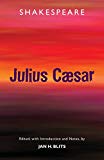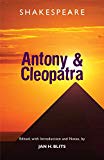Books Reviewed
Two summers ago, New York City’s Public Theater staged the assassination of Donald Trump. Their production of Shakespeare’s Julius Caesar styled the title character as a Twitter-happy blonde bloviator whose gory deposition looked to many like a savage display of hostility toward the commander-in-chief.
Well-spoken cultural authorities emerged from the heavens to assure us that, of course, the play in no way endorses political violence. Harvard University’s Stephen Greenblatt, known for his popular scholarship on Shakespeare, called it “kind of amusing, in a slightly grim way,” that silly conservatives would get up in arms about a harmless instance of free artistic expression.
True, Julius Caesar leaves us suspecting that the conspirators’ ends may not have justified their means. But America’s artistic landscape has been relentlessly dominated by political revenge porn. Comedienne Kathy Griffin appeared in a 2017 photo op with a Trump mask made to look like the president’s severed head, and every awards show features a stirring call to resistance. Right-wingers may be forgiven for wondering whether the overwhelmingly liberal New York theatre community didn’t relish slaughtering the president in effigy.
More than anything, though, Caesar-as-Trump was a desperate grasp at relevance—a forced attempt to shoehorn a great playwright into a modern staging. Shakespeare’s play is concerned with the terrible dilemma that faces patriots when a real constitutional crisis necessitates drastic measures—not just when the guy in office happens to be unpalatable. Trump is no Caesar. Kathy Griffin is no Shakespeare.
What if, instead of making Shakespeare’s historical dramas into tortured analogues for our present moment, we considered them as earnest attempts to penetrate the issues of the past? That is the premise behind Jan H. Blits’s new annotated editions of the Roman plays: Julius Caesar, out last year; Antony and Cleopatra, which appeared this September; and a forthcoming Coriolanus. Blits treats the trilogy not as a parable for 16th- or 21st-century politics, but as a searchingly philosophical depiction of the pagan world’s anguished transformation into Christendom.
* * *
Blits, a professor emeritus at the University of Delaware School of Education, is clearly indebted to Shakespeare’s Politics (1964) by Allan Bloom and Harry V. Jaffa, as well as Shakespeare’s Rome (1976) and Shakespeare’s Roman Trilogy (2017) by Paul Cantor. These books gainsaid a trendy strain of historicist thought which held that Shakespeare could have no real insight into any time other than his own Elizabethan England.
By contrast, Cantor and Blits see in the Bard a serious scholar of antiquity grappling with the same question that haunted Edward Gibbon and Friedrich Nietzsche: how did the noble champions of Roman liberty succumb to the universalizing quietism which made both Augustus and Christ into plausible rulers of the world?
Blits therefore juxtaposes each play with primary texts from the Roman imperial period in notes at the bottom of each page. He frequently cites the 1st-century-A.D. essayist Plutarch, whom Shakespeare read carefully in Sir Thomas North’s translation. Blits points out that even small details (e.g., the “distinctive mincing diction” of the minor lackey Gaius Maecenas) are faithfully drawn from ancient accounts. Because these parallels between history and drama are so closely observed, the editions also reveal meaning and significance in moments when Shakespeare does depart from his source material.
For example: Shakespeare has Octavian, soon to be the Emperor Augustus, weep in public when he hears that Marc Antony, his ally-turned-nemesis, is vanquished. Plutarch’s Octavian hid his tears but, Blits argues, there is a reason why Shakespeare makes his budding monarch flaunt his magnanimity in victory. The trilogy as a whole contrasts such ostentatious demonstrations of egotistical benevolence with the old-fashioned Roman brand of Stoic fortitude and self-sacrifice. That venerable code of honor is passing from the world because Rome, in Blits’s words, “has ceased to be a city or a community.” Shakespeare saw in Rome’s massive territorial expansion the death of its old civic values: if Rome is everywhere then it is nowhere, too abstract to love or to die for.
* * *
And so, as Act V of Antony and Cleopatra opens with Octavian’s victory, Blits shifts to a new frame of reference: he believes that Shakespeare is now concerned less with Plutarch than with the Book of Revelation. Empire calls forth “a new heaven and a new earth” wherein all the universe must bow to one authority. Either men will worship Caesar, or they will submit their hearts to the gentle yoke of a strange new peasant king who comes barefoot from the East. Either Rome or Christ must now be all in all.
Ironically, Blits’s excellent reading of the play—so ostensibly distant from our modern Trumpian anxieties—turns out to be deeply “relevant” after all. What happens when a ragtag rebel nation sprawls outward into a globalist superpower whose newfound dominance dilutes the fellow feeling of its citizens? What force is strong enough to unite the hearts of countrymen separated by geographical and ideological chasms? These are Shakespeare’s real questions. They are also our own. If we avoid mining his plays for punditry and sloganeering, the Bard may help us find some answers.



